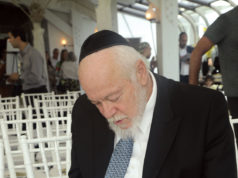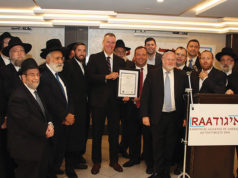
With the abolition of the Inquisition in 1821, families of Sephardic Jews decided to return to Portugal. Most of these Jews were merchants from Morocco and Gibraltar. These were people with a cultural level greatly above average. They could read, speak and write in liturgical Hebrew, Arabic, English and Hakitia, the Moroccan judeo-hispanic dialect.
They all had numerous international contacts, not only because of their business activities but also because of their family ties all over the world. These factors explain the rapid economic and cultural development not only of the Lisbon Jews, but also of the many families, which arrived in the Azores and the south of Portugal during the first half of the 19th century.
Alongside their successful integration into Portuguese everyday life, the first Jewish families immediately sought to create a community life, and established houses of prayer and purchased land where they could bury their dead according to the Jewish rite.
The first steps towards the creation and simultaneous recognition of the Lisbon Jewish community were taken in 1868, when the Portuguese government, in a decree by King D. Luis, granted the Jews of Lisbon permission to establish a cemetery. This cemetery is located at the Calçada das Lajes and is still in use. This royal grant is of historic importance as it involved the implicit, albeit unofficial, recognition of the Lisbon Jewish community. It should be noted that, at that time, the Jews were considered a foreign colony.
The Jews of Lisbon established numerous charitable institutions during the second part of the 19th century. These independent associations or private foundations were normally run by women and played a decisive role in the unification and organization of Portuguese Judaism.

Somej-Nophlim was founded in 1865 by Simão Anahory, in order to aid the poor. In 1916, Anahory also founded the Israelite Hospital, which provided invaluable assistance to refugees during World War II. And Guemilut Hassadim, founded by Moses Anahory in 1892, provided spiritual aid and Jewish burials. Cozinha Economica (low price canteen) was founded in 1899, and like the Israelite Hospital, was to play a decisive role in the provision of aid to refugees during World War II.
The creation of a committee for the construction of a single synagogue and the election of the 1st Committee of the Lisbon Jewish Community (honorary President, Abraham Bensaúde, serving President, Simão Anahory), commenced at the end of the 19th century, under the leadership of Isaac Levy and Simão Anahory.
Despite the difficulties caused by the lack of official recognition, the Jewish community managed to purchase land for the construction of the synagogue. The ceremonial inauguration of the Shaaré Tikvá (Gates of Hope) Synagogue, designed by the famous architect of that time, Ventura Terra, took place on May 19, 1904.
Located at number 59 Rua Alexandre Herculano, the synagogue was constructed inside a garden, because the legislation of that time did not permit non-Catholic places of worship to abut directly onto the public highway.
It was only after the establishment of the Portuguese Republic that the by-laws of the Jewish community were finally approved by the government. The Lisbon Jewish community was officially recognized in 1912, exactly 416 years after the edict to expel the Jews from Portugal, (in 1497), and almost a century after the abolition of the Portuguese Inquisition (in 1821).
The Hebraic Studies Association “Uba le Zion,” led by Adolfo Benarus, was founded in 1912. In 1929, Benarus also founded the Lisbon Jewish School, which had almost 100 pupils and three Hebraic studies teachers.
The creation of an information bulletin, edited by Joseph Benoliel, which provided a real link between the members of the Jewish community, the organization of a library in 1915 and the creation of the Jewish Youth Organization Hahaver in 1925, also helped to consolidate the community.
From this time onwards, the course of events, which was placing all Europe in turmoil, was to give rise to a profound change in the activity and composition of the Lisbon Jewish community.
The anti-Semitic persecutions in Eastern Europe, particularly in Poland, and the rapid rise to power of Nazism in Germany led to the gradual arrival in Portugal of the first Ashkenazi Jews, who rapidly became integrated within Portuguese society and the community.
During the war, Portugal’s neutrality and the grant of transit visas to almost 100,000 refugees led to a continuous flow of tens of thousands of Jews, who arrived in Lisbon.
Aristide de Sousa Mendes, the Portuguese Consul in Bordeaux, granted more than 30,000 Portuguese visas without the permission of his superiors and thus saved thousands of Jewish families.
Lisbon was at that time the only European port from which it was possible to flee to the United States or Latin America.

Portuguese Jews played a key role during this period in the provision of assistance to the refugees, with the creation of the Portuguese Committee for the Assistance of Jewish Refugees in Portugal (COMASSIS), which was led by Augusto Esaguy and Elias Baruel, and had Moses Amzalak and Adolfo Benarus as its honorary chairmen. COMASSIS operated the Cozinha Económica and the Jewish Hospital and provided food, clothing and medical care to the refugees.
Unfortunately the government did not allow the refugees to settle in Portugal and, unlike other countries of exile, the refugees did not establish cultural associations or businesses and Portugal failed to benefit from the refugees’ experience and initiative, because of the strict nationalism of Salazar and his fear that the Portuguese people might be “contaminated” by the foreigners.
The Lisbon Jewish community remained demographically stable until 1961, when the outbreak of the Colonial War in Angola caused many young people and later whole families to emigrate to other countries in order to avoid the war. Many settled in Israel.
The community is now very small—there are less than 300 memebers—but it strives to keep the following essential services in operation: the synagogue, the cemetery, the community center and Somej Nophelim.



